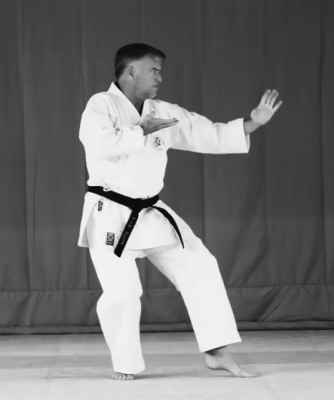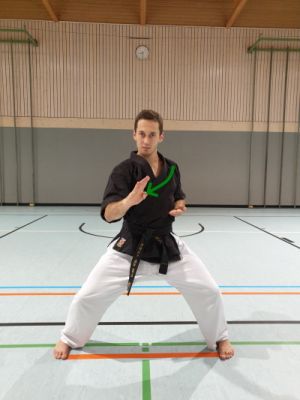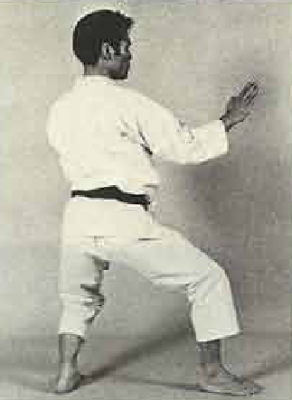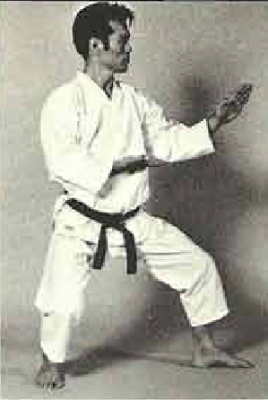Shuto-Uke: Unterschied zwischen den Versionen
(→Bilder) |
Keine Bearbeitungszusammenfassung |
||
| Zeile 4: | Zeile 4: | ||
Der Shuto-Uke ist ein Block, welcher mit der Handkante ([[Trefferflächen]]) ausgeführt wird. Dafür wird in der Ausführung die Blockhand an der gegenüberliegenden Schulter angelegt und mit einer einfache Vorwärtsbewegung vor dem Körper gebracht. Der Ellenbogen bleibt dabei fast auf der gleichen Position stehen, lediglich der Unterarm bewegt sich. Der Blockarm kommt in einem 45° zum Körper zu stehen, mit der Hand schräg nach unten, vorne gerichtet. Der Shuto-Uke wird meist aus dem [[Kokutsu-Dachi]] ausgeführt. | Der Shuto-Uke ist ein Block, welcher mit der Handkante ([[Trefferflächen]]) ausgeführt wird. Dafür wird in der Ausführung die Blockhand an der gegenüberliegenden Schulter angelegt und mit einer einfache Vorwärtsbewegung vor dem Körper gebracht. Der Ellenbogen bleibt dabei fast auf der gleichen Position stehen, lediglich der Unterarm bewegt sich. Der Blockarm kommt in einem 45° zum Körper zu stehen, mit der Hand schräg nach unten, vorne gerichtet. Der Shuto-Uke wird meist aus dem [[Kokutsu-Dachi]] ausgeführt. | ||
Funakoshi beschreibt in ''Karate-Do Kyohan'' | Funakoshi beschreibt in ''Karate-Do Kyohan'' diesen Block wie folgt: <br> | ||
<cite> | <cite> | ||
With the right foot forward, bring the right sword hand to a point above the left shoulder and swing it across toward the right side in a slightly downward motion of defiecting a front attack of an opponent. Stop the block with the elbow above the right leg, bent in a right angle and hooked slightly inward toward the body. At this point, the trunk should be erect, and the eyes, blocking hand, and forward foot directed toward the opponent. The hips should be in a half-facing position, and in one's practice, which consists of performing advancing or retreating series of alternating right and left blocks, the body should be set as if one were deftly parrying front attacks | With the right foot forward, bring the right sword hand to a point above the left shoulder and swing it across toward the right side in a slightly downward motion of defiecting a front attack of an opponent. Stop the block with the elbow above the right leg, bent in a right angle and hooked slightly inward toward the body. At this point, the trunk should be erect, and the eyes, blocking hand, and forward foot directed toward the opponent. The hips should be in a half-facing position, and in one's practice, which consists of performing advancing or retreating series of alternating right and left blocks, the body should be set as if one were deftly parrying front attacks | ||
Version vom 26. November 2021, 11:34 Uhr
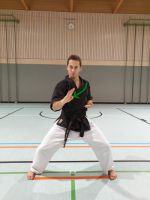
Der Shuto-Uke ist ein Block, welcher mit der Handkante (Trefferflächen) ausgeführt wird. Dafür wird in der Ausführung die Blockhand an der gegenüberliegenden Schulter angelegt und mit einer einfache Vorwärtsbewegung vor dem Körper gebracht. Der Ellenbogen bleibt dabei fast auf der gleichen Position stehen, lediglich der Unterarm bewegt sich. Der Blockarm kommt in einem 45° zum Körper zu stehen, mit der Hand schräg nach unten, vorne gerichtet. Der Shuto-Uke wird meist aus dem Kokutsu-Dachi ausgeführt.
Funakoshi beschreibt in Karate-Do Kyohan diesen Block wie folgt:
With the right foot forward, bring the right sword hand to a point above the left shoulder and swing it across toward the right side in a slightly downward motion of defiecting a front attack of an opponent. Stop the block with the elbow above the right leg, bent in a right angle and hooked slightly inward toward the body. At this point, the trunk should be erect, and the eyes, blocking hand, and forward foot directed toward the opponent. The hips should be in a half-facing position, and in one's practice, which consists of performing advancing or retreating series of alternating right and left blocks, the body should be set as if one were deftly parrying front attacks
Etymologie
| Bezeichnung | Herkunft | Übersetzung |
|---|---|---|
| Shuto-Uke | 手刀受け (jap.) | Handkantenabwehr |
Siehe auch: Wörterbuch
Bilder
Quellen
- Prüfungsordnung Kempo-Karate, 1. Auflage 2008
- https://de.wikipedia.org/wiki/Liste_von_Karate-Begriffen (Abgerufen am 26.11.2021)
- Karate-Do Kyohan: The Master Text (1935) von Gichin Funakoshi

